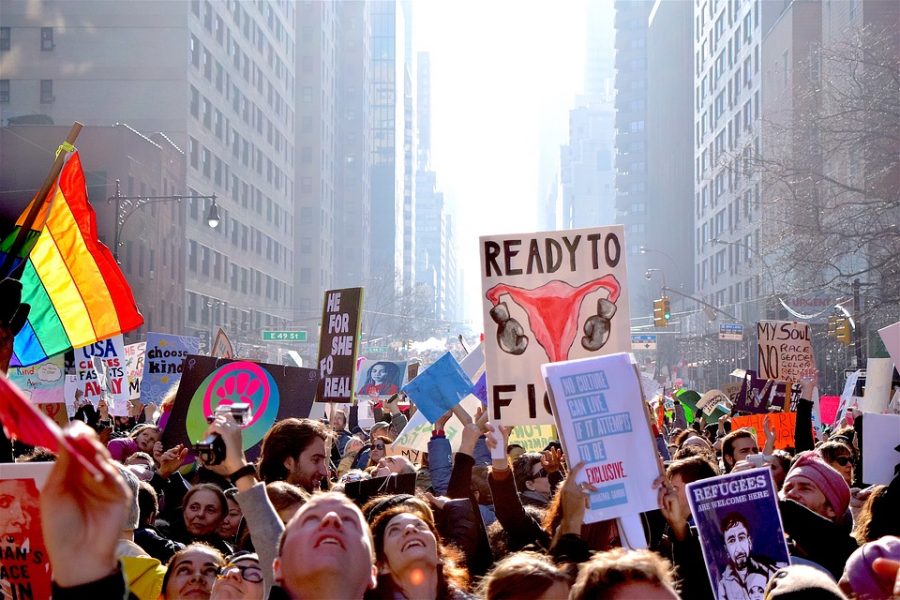OPINION: We Need to Talk about ‘Just Girl Things’
November 9, 2017
Periods, birth control, abortions. All of these have one thing in common: people don’t want to talk about them. But these are things we need to have a discussion about. It’s time to get over the irrational fear of talking about these issues. Every day women face a multitude of issues that can multiply if they remain unresolved. By discussing this wide variety of problems that many women face, it can help bring about conversation and reject the idea that talking about these things are taboo.
The first thing we need to address is periods — there’s a whole aisle in the grocery store dedicated to menstruation products, after all. Women struggle every month for three to seven days, sometimes longer, and can’t have an honest discussion about it without fear of being ridiculed by their peers. The agonizing pain of cramps, the anxiety of bleeding every month, and women are told to “just deal with it.” What some fail to realize is that there are many complications we aren’t educated about. Endometriosis, among other diseases, affects 200,000 women each year and many remain unaware of its existence. Symptoms like intense abdominal pain, abnormal menstruation, nausea, and even infertility affect women with endometriosis. It stems from tissue growing on the outside of the uterus and women are told that there’s nothing wrong or that it’s just another symptom of menstruation, when the effects are actually because of a serious disorder. Without education about disorders like endometriosis, they will continue to go untreated. Sexual education teaches young girls about abstinence and the dangers of sex, while glossing over how to properly deal with a period or realize when something is seriously wrong. Why are we so afraid to talk about this when it could be seriously dangerous? Periods aren’t inherently sexual, and casually mentioning a pad or tampon shouldn’t be seen as taboo. Men need to get over their fears of periods, and women need to stand up and start properly educating themselves on exactly what periods are.
Along the same lines of periods, birth control is bound to come up in the conversation. Using birth control starting becoming popular in the 1950s and 1960s, giving many women the freedom to embrace their sexuality. Birth control evolved quickly with the progression of modern medicine, and more recently became used to help regulate periods alongside limiting pregnancy. More extreme versions of birth control, like IUDs, can stop periods and pregnancy all together. But under the Affordable Care Act, also known as ObamaCare, all forms of birth control are fully covered by insurance. If Republicans repeal the Affordable Care Act, not only will it affect how many Americans receive health care, but it will also deny full coverage for different types of birth control that do much more than just stop pregnancy. They can stop serious health problems, help regulate periods and hormones, and greatly reduce the chances of teen pregnancy, but since the new healthcare bill doesn’t see these benefits, they’ve decided their health care doesn’t need to cover it. Without birth control, not only will lower income families have to deal with the burden of suddenly being without coverage, but they’ll also have to deal with going completely cold turkey. Birth control is not just another way of preventing pregnancy, it’s actually been shown to help many teens with hormone imbalances that clear acne and help with period pain. To suddenly rip this from many women would be a crime, and we need to treat it as so. Old white congressmen shouldn’t be able to tell us what we do and don’t need. Protest this bill as much as you can by emailing and texting your congressional representative.
The final issue in the myriad of problems that affect women is abortion. Controversial and the center of many conversations, the issue of abortions plagues the nation. For some reason, some people think they’re entitled to an opinion about every woman’s uterus and what she decides to do with it. What a woman decides to do with her body is her decision and somehow, in 2017, some people still fail to grasp that. According to the CDC, the abortion rate in 2013 per 1,000 women aged 15-44 was 12.5. While that may seem like very few, a lot of these abortions stem from accidental pregnancies. Teens who accidentally get pregnant should be given the option to have an abortion, because a child is a lot of responsibility. A majority of the time, teenagers aren’t ready to have the huge responsibility of a child and to try force someone who isn’t ready to carry that burden by taking away their choice can seriously affect their mental health and how the children grow up. Once the child is born, it’s almost like people stop caring about their well being. We need to take a look at the programs we provide for abandoned children before we continue to argue about abortion.
The problem is people are afraid of conversation. No one wants to talk about these issues because they are seen as taboo. Women are constantly told that their experiences are invalid, that their issues or inconveniences aren’t important enough to warrant discussion. Having no conversation creates a mass problem that remains unacknowledged. Open up dialogue, research, and don’t let women go unheard. That is the first step towards a world where we can finally talk.




Dana Jay • Nov 10, 2017 at 8:05 am
Wow! Thank you so much for writing an article that tackles women’s issues. Women’s voices need to be heard and I’m so proud of you for using yours.